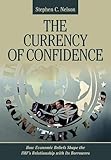The currency of confidence : how economic beliefs shape the IMF's relationship with its borrowers / Stephen C. Nelson.
Material type: TextSeries: Cornell studies in moneyPublisher: Ithaca : Cornell University Press, 2017Copyright date: �2017Description: 1 online resource (xi, 232 pages)Content type:
TextSeries: Cornell studies in moneyPublisher: Ithaca : Cornell University Press, 2017Copyright date: �2017Description: 1 online resource (xi, 232 pages)Content type: - text
- computer
- online resource
- 9781501708305
- 1501708309
- 9781501708299
- 1501708295
- How economic beliefs shape the International Monetary Fund's relationship with its borrowers
- 332.1/52 23
- HG3881.5.I58 N45 2017
Includes bibliographical references and index.
Understanding the IMF and its borrowers -- How shared economic beliefs shape loan size, conditionality, and enforcement decisions -- Playing favorites : quantitative evidence linking shared economic beliefs to variation in IMF treatment -- Argentina and the IMF in turbulent times, 1976-1984 -- From one crisis to the next : IMF-Argentine relations, 1985-2002 -- Staying alive : IMF lending programs and the political survival of economic policymakers -- Implications, extensions, and speculations : the IMF and its borrowers, in and out of hard times.
Online resource; title from digital title page (viewed on March 20, 2017).
This work suggests that the International Monetary Fund (IMF) is a purposive actor in world politics, primarily driven by a set of homogenous economic ideas, with professional staff who emerged from an insular set of American-trained economists.
eBooks on EBSCOhost EBSCO eBook Subscription Academic Collection - Worldwide

